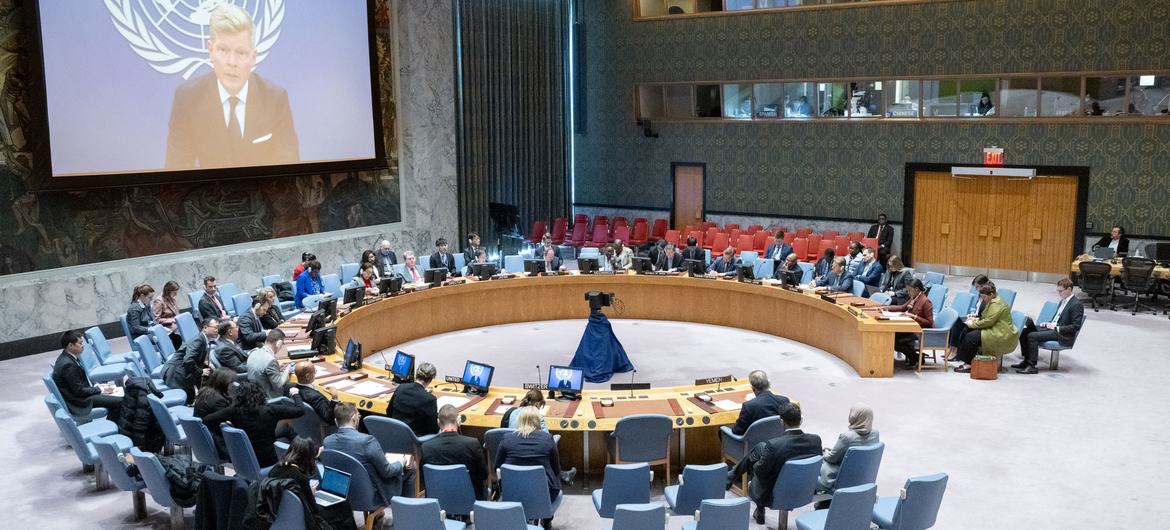Yemen: Recent progress marred by Gaza war fallout, UN envoy reports

The shockwaves from the war in Gaza continue to reverberate across the wider Middle East region, with the situation in Yemen much more complex than it was a few months ago, the UN Special Envoy for the country said on Wednesday.
Briefing the Security Council, Hans Grundberg recalled “steady progress” in UN efforts to mediate the the complex decade-long crisis, set off by the overthrow of the Government by Houthi rebels in 2014.
However, the locus of attention has shifted dramatically since December 2023 due to the Israel-Gaza war and the military escalation in the Red Sea.
“As much as I have tried to insulate the peace process from wider regional dynamics, the reality is that mediation efforts in Yemen cannot be neatly cordoned off. What happens regionally impacts Yemen, and what happens in Yemen can impact the region,” he said.
Despite the deteriorating situation, efforts to resolve the crisis in Yemen would continue no matter what, Mr. Grundberg stressed, adding that it is vital to preserve the political space and keep open the channels of communication.
Complicated crisis
Yemen’s civil war began in September 2014 when Houthi rebels took the capital, Sana’a, forcing the Government to leave, and leading to a military intervention by a Saudi-led coalition in support of the Government in early 2015.
The conflict has resulted in widespread displacement, food and medical shortages, and a cholera outbreak, prompting the UN to label the situation as the world’s worst humanitarian crisis, with millions of civilians in urgent need of assistance.
Hundreds of thousands of people have died because of the fighting or due to starvation, and about 15 per cent of the population are displaced – most of whom have been displaced multiple times.
The situation is further complicated by political instability and ongoing violence - and, more recently, the spillover of the crisis in Gaza – exacerbating the suffering of the civilian population.
‘A sense of foreboding’
Mr. Grundberg cited “worrying developments” within Yemen and “a sense of foreboding” on several fronts – from the economy to public infrastructure and services.
“Although the path to peace now faces more challenges, my mediation approach is flexible enough to adapt to different scenarios and challenges,” he said, calling for efforts to create an “off-ramp” to the escalating crisis.
A regional de-escalation is urgently needed, he added, noting also the need for Yemeni actors to refrain from “military opportunism”, and for parties to refocus on safeguarding the progress made thus far toward reaching an agreement.
“There is no reason Yemenis should be condemned to conditions of war, poverty and repression,” the Special Envoy underscored.
“Yemenis deserve nothing less. We’ve seen successful peace processes in other contexts unlock many of these gains. And in Yemen, there is a compelling alternative to the path of conflict and economic ruin.”

Humanitarian situation
On the humanitarian side, Yemen remains a picture of “massive, continuing needs”, Edem Wosornu, Director of Operations, at the UN Office for the Coordination of Humanitarian Affairs (OCHA), told the ambassadors.
In 2024, over 18.2 million people – over half the population – will need humanitarian assistance and protection services, and over 11 million are children.
Across the country, over 70 per cent of three-year-olds have not received a full course of basic vaccinations, 80 per cent of the population lives below the poverty line and less than half of all hospitals are functioning – fully or partially.
The crisis is further complicated by the hostilities in the Red Sea and the impact on aid transport through the Hodeidah and Aden ports.
“The situation will continue to deteriorate without urgent and sufficient attention,” Ms. Wosornu said.
She recalled the UN’s $2.7 billion humanitarian appeal to assist some 11.2 million people across the war-torn country, urging the international community to step up and ensure relief operations have the funds they need to reach those in desperate need.



.jpg)

.png)

.png)






.jpeg)

Comment List